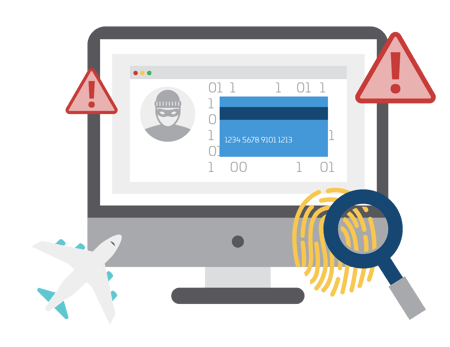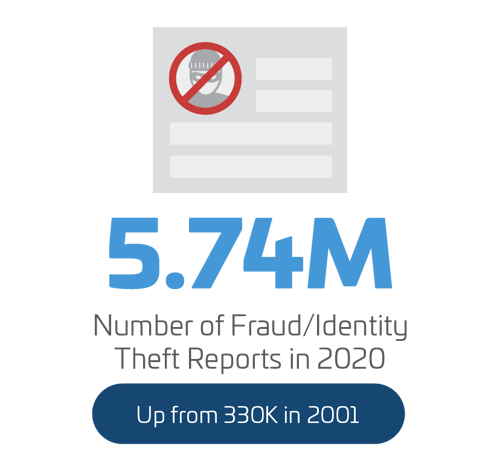This post was originally written by Vesta for our friends over at Fingerprint! Be sure to check out their [awesome] website and their fantastic blogs!

Online Travel Agencies (OTA) like Booking.com, Expedia, and Skyscanner are on the frontlines in the fight against eCommerce fraud. Why? Well, frankly, there’s a high resell value for airline ticketing and hotel bookings and an absence (most of the time) of physical goods making the industry a prime target for fraudsters.
But there are ways to win the battle against bad actors! In this post, we’ll explore some of the fraud types that OTAs are facing, how to detect fraud, and a few tips for OTAs and their customers. First, we need to define online travel fraud.

What Is Online Travel Fraud?
Online travel fraud is a type of eCommerce fraud where fraudsters target travel and booking websites and their customers. Spoiler alert: Online travel fraud isn’t much different than any other type of eCommerce or online payment fraud.
The online travel agency vertical is, however, more highly targeted than other industries. That’s because of the high resell value for airline tickets, hotel room bookings, packaged getaways, and excursion bookings. Who doesn’t love the beach? Or the idea of a four-night cruise with a little excursion built in? Fraudsters know it’s an easy sell.
And the types of fraud that bad actors use will likely be very familiar to online merchants, fraud victims, and even fraud prevention companies everywhere:
- Fake or Stolen Payment Cards
Fraudsters use stolen credit card numbers paired with personal identifying information to attack people and companies everyday across the globe. According to the National Council on Identity Theft Protection, fraud cases are up 70% from 2020, accounting for $392M in losses from consumer online shopping.
- Chargeback Fraud
Chargeback fraud happens when online shoppers abuse the chargeback process intentionally. As it relates to online travel agencies, a bad actor might purchase a flight, take the flight, and then initiate a chargeback afterwards where the goal is to get free travel. Of course, travel isn’t free—the OTA would end up paying the bill if the chargeback is successful.
- Account Takeover
Account takeover (ATO) fraud is rampant in the travel industry. Fraudsters send emails or text messages posing as an OTA. A link is usually included in the email or text, and when an unsuspecting customer clicks or taps to open the link, they’re taken to a fake website that’s been designed to capture their login credentials.
- Ticket Cancellation
And then there’s ticket cancellation fraud. This happens when fraudsters book a flight or hotel with stolen credit card numbers and then receive the airline bonus points, rewards points, which fraudsters can then use to purchase more tickets or resell for profit.
Now that you’re aware of the types of online travel fraud targeting OTAs, let’s take a look at how travel booking sites can prevent fraudulent attacks on their business. We’ll also explore a few tips for travel customers to protect themselves from bad actors.
How Can OTAs Help Prevent Online Travel Fraud?
There are two main solution categories that OTAs should focus on to prevent travel booking and ticketing fraud attacks:
- Identity verification
As the Fingerprint experts published in their blog post, by uniquely identifying malicious visitors and related patterns of fraudulent activity, ecommerce store owners can take proactive measures to reduce the risk of compromise. - Fraud prevention
Once you know who is using your site, you can rely on your fraud prevention solution provider to employ powerful technologies that detect and prevent online payment fraud.
Leading companies like Vesta can provide OTAs with a fraud prevention platform that employs machine learning, artificial intelligence, and link analysis that uncovers fraud patterns and even takes on the risk of fraud.
What Can Travel Customers Do to Help?
Customers booking travel need to ensure that they’re booking from a legitimate OTA. Let’s explore just a few tips and some questions that customers should ask themselves.
1. Use two or three really well-known OTAs as your point of reference. For example, if Booking.com or Expedia have price ranges in the same ballpark, you can safely assume that you should expect to pay (approximately, at least) those prices.
2. Did you arrive at this travel website through a link you clicked in email or text? If so, be absolutely sure that the email or text came from a legitimate OTA. Why? Many times, fraudsters will re-create a website to look like an authentic, travel booking site, but the goal is to steal your payment card details and/or account information!
3. Read the reviews on Google, Tripadvisor, or another reputable review website for travel. Trusted review websites are a solid tool for travelers to be sure they’re not only reserving a good hotel room but that other travelers can vouch for the experience of getting what they paid for.

Watch the Vesta Platform in Action!
Apart from partnering with a trusted fraud prevention company that leverages identity verification technology, OTAs can take additional steps to mitigate fraud losses such as manual reviews, custom rules, blacklist/whitelist, and good old-fashioned KYC.
Reputable OTAs have a good amount of data on their travelers. Tapping into that data to prevent fraud is good. Pairing that data with a top identity verification company and fraud prevention solution is even better!
Staggering Statistics for Identity Theft
Credit card fraud is the most common type of identity theft according to the latest Federal Trade Commission report saying, “identity thieves access a registered credit card of a victim or manipulate people into sending them money.”
The most common types of identity theft are account takeover, fraudulent new account openings, and informational theft for financial gains.
Unfortunately, each of these methods are used in online travel fraud making it vitally important for both OTAs and their customers to remain vigilant when booking travel online.

Conclusion and Next Steps
It’s important to remember that fighting fraud is a never-ending battle that requires companies and customers alike to act quickly. Customers should use or make a fraud awareness checklist when booking travel online. Merchants and OTAs should ensure they’re leveraging high-value partnerships with specialist providers in the identity verification and fraud detection space that go above and beyond built-in capabilities from payment providers.

To learn more about why Fingerprint is the best choice for user/visitor identification, give them a test drive today—it’s free for ten days with unlimited API calls. They’re definitely a Vesta-trusted partner in identity verification as a fraud prevention measure.
And you can solidify your solution set even more when you add Vesta’s Payment Guarantee to your fraud-prevention arsenal. With Payment Guarantee, you’ll never pay for a chargeback again—whether your customers are booking travel or just shopping online!
Are you ready to start maximizing revenue today? Get in touch with us for a quick chat about how the Vesta platform can take your cost of fraud to $0. Guaranteed.
Safe and happy travels from your fraud-fighting friends, Fingerprint and Vesta.
.png)
.png)
%20(1).png)


